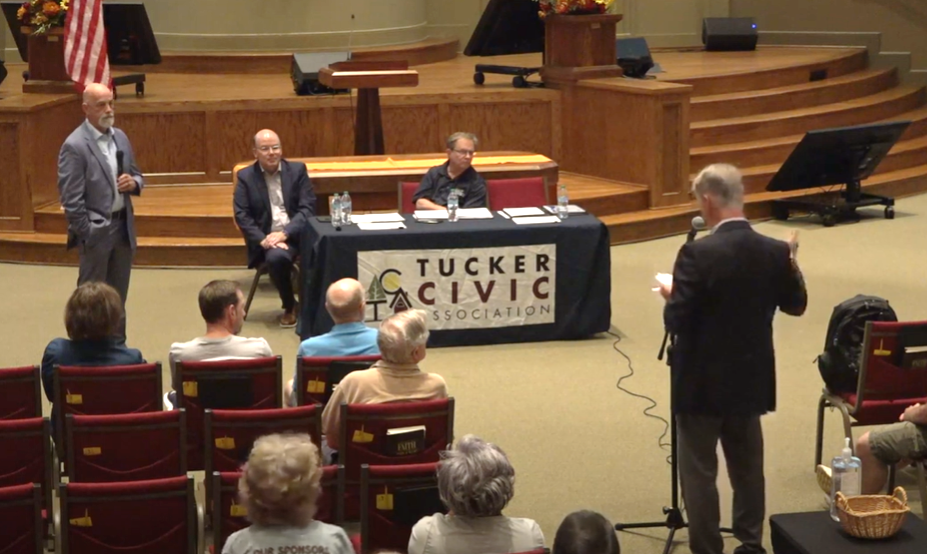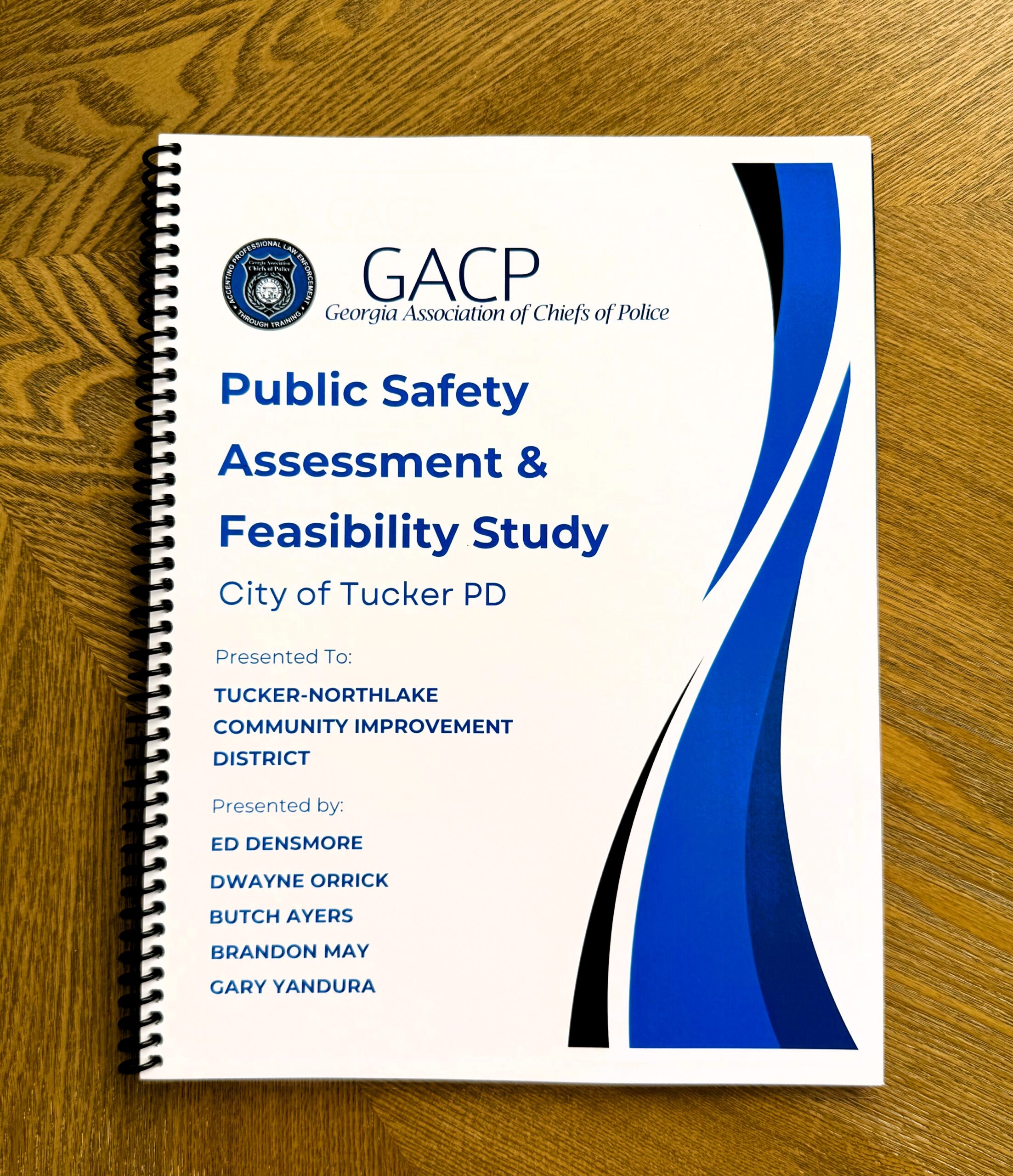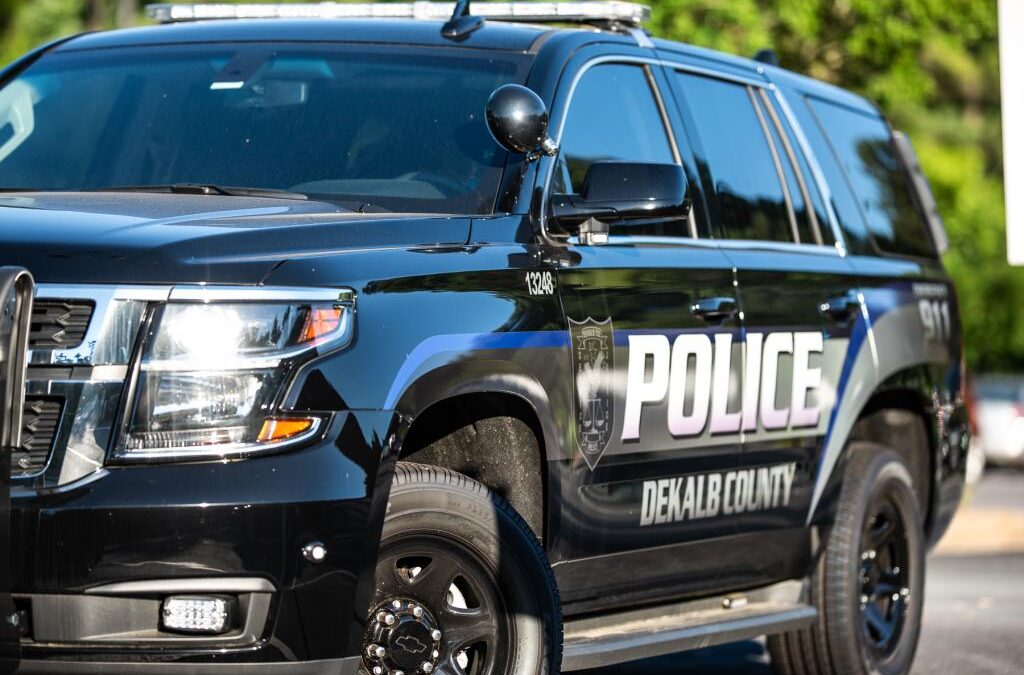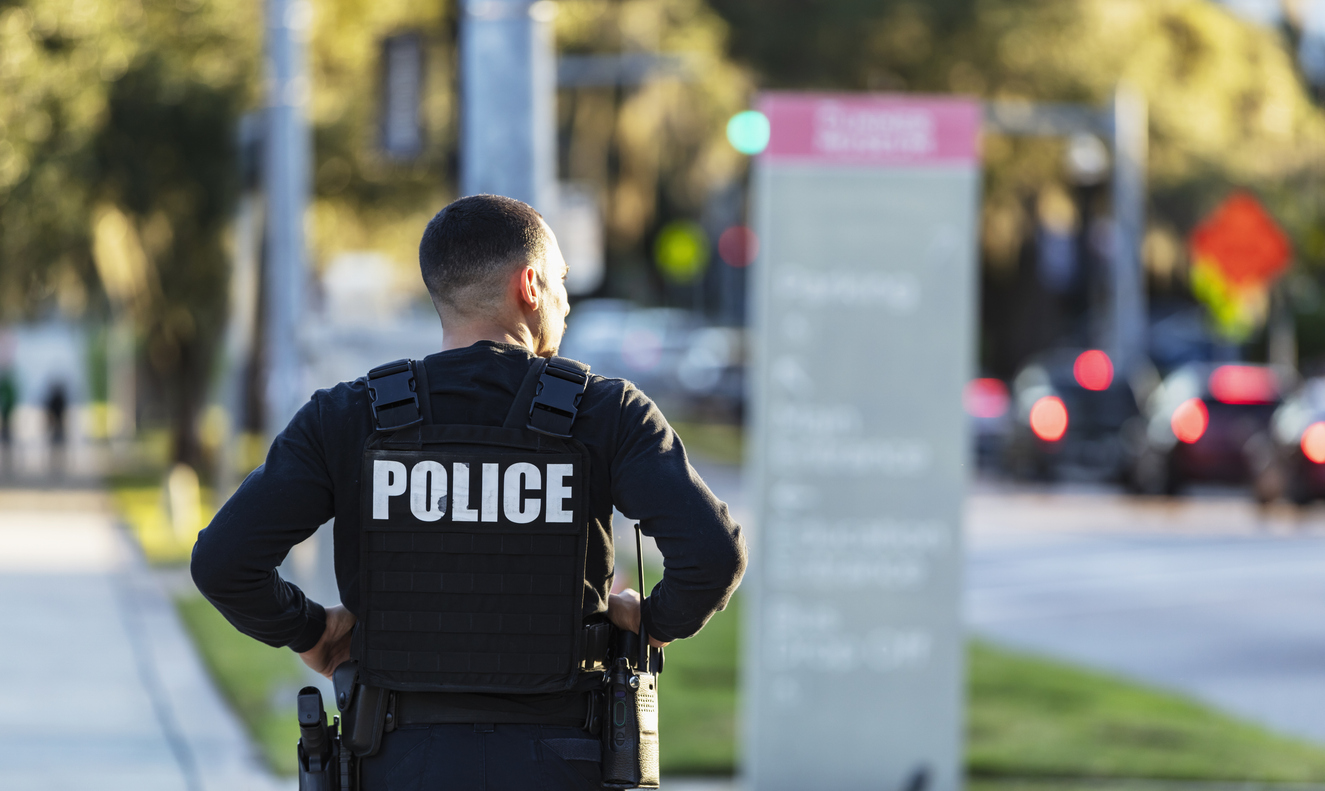About the Study
In 2020, DeKalb County published a study examining the financial impact of cityhood. The study found that Tucker’s existing tax base could support a municipal police department without a tax increase. However, the analysis focused solely on revenue, not on startup costs or service levels.
Building on that study, in January 2025 the Tucker-Northlake CID initiated a public safety assessment and feasibility study, with the Georgia Association of Chiefs of Police (GACP), to determine if a Tucker Police Department could match or exceed the level of service currently provided by DeKalb County.
The GACP study confirms that a city police department is feasible with opportunity for increased service levels. This website exists to make the information in the study accessible to all.
The Tucker-Northlake CID and our partners continue to be open about our goals to improve public safety. CEO Lorraine Cochran-Johnson and her leadership team were informed early in this process and have been given copies of the study.
We respect the diligent work of the DeKalb County Police Department—particularly the officers who respond to back-to-back calls in difficult situations every day. DeKalb County is not our adversary. Crime and indifference are the enemy. We are taking a proactive and inclusive approach to finding solutions, and we appreciate all that DeKalb County is doing simultaneously to improve conditions within the department and countywide.
We have also kept Tucker Mayor Frank Auman and interested members of the City Council informed. We appreciate their stewardship over taxpayer resources, and interest in our vision to make Tucker the safest community in DeKalb and one of the safest in metro Atlanta.
Resources
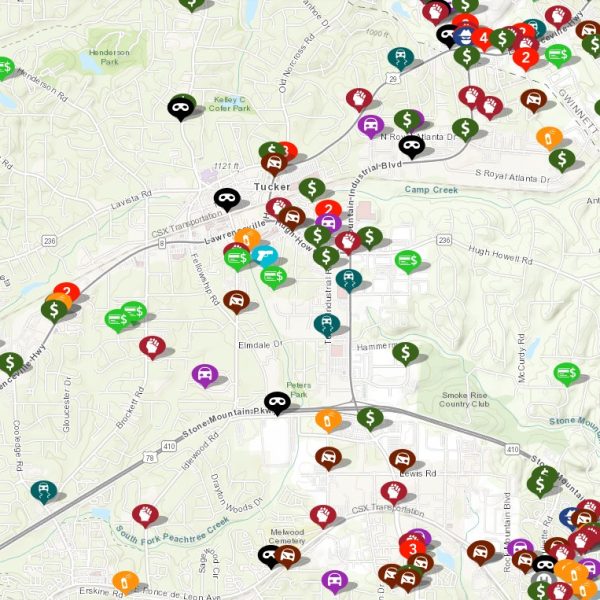
Public Safety Survey
The Tucker-Northlake CID is conducting an independent public safety survey to better understand community perceptions and experiences with 911, police response, and crime in and around Tucker. Your responses will help inform our conversations with city and county leaders as they consider priorities for safety, service delivery and resource allocation.
Each survey is anonymous and takes approximately 10 to 12 minutes to complete.
Frequently Asked Questions
Below are frequently asked questions about the study and public safety in Tucker.
Will forming a city police department require a tax increase?
No. In 2024, property owners in Tucker paid $15.9 million to DeKalb County for police services. In the current tax year, the DeKalb County Board of Commissioner’s chose to reduce funding for Police Services lowering this amount to $15.5 million. According to the Georgia Association of Chiefs of Police, the City of Tucker could establish and operate its own professional police department for just $10.7 million. That would leave the city with nearly $5 million to enhance police staffing, equipment, and operations without raising taxes.
Who provides police services for the City of Tucker and what is included?
The DeKalb County Police Department provides police services to the City of Tucker through intergovernmental agreement. “Police Services” includes patrols, investigations, traffic enforcement, and other department functions. It does not include 911, EMS, or Fire Rescue. These other services are managed by DeKalb County separately.
How many cities in Metro Atlanta have their own police departments?
There are 67 cities in the 11 County Atlanta Region. Of those 79% operate their own police departments.
53 cities operate their own police departments (79.1%)
6 cities are served by county police (8.9%)
5 cities are policed by county sheriff’s offices (7.4%)
3 cities use a combination of county police and a city marshal for policing (4.4%)
Of the five cities using only county police, four incorporated within the last ten years.
Here is a listing of each city by service provider:
Cities with a Police Department | |||
City | County | Population | Square Miles |
Acworth | Cobb | 22,370 | 9.72 |
Alpharetta | Fulton | 66,355 | 27.27 |
Atlanta | Fulton | 499,287 | 136.35 |
Austell | Cobb | 8,351 | 5.95 |
Avondale Estates | Dekalb | 3,525 | 1.23 |
Ball Ground | Cherokee | 2,665 | 6.37 |
Brookhaven | Dekalb | 57,224 | 11.81 |
Canton | Cherokee | 34,587 | 19.01 |
Chamblee | Dekalb | 30,369 | 7.70 |
Clarkston | Dekalb | 14,560 | 1.86 |
College Park | Clayton/Fulton | 13,969 | 11.14 |
Conyers | Rockdale | 17,916 | 11.87 |
Cumming | Forsyth | 7,869 | 7.23 |
Decatur | Dekalb | 24,470 | 4.60 |
Doraville | Dekalb | 10,738 | 4.91 |
Douglasville | Douglas | 36,284 | 22.96 |
Duluth | Gwinnett | 31,958 | 10.39 |
Dunwoody | DeKalb | 51,563 | 13.25 |
East Point | Fulton | 38,233 | 14.71 |
Fairburn | Fulton | 16,609 | 17.13 |
Fayetteville | Fayette | 19,364 | 13.19 |
Forest Park | Clayton | 19,619 | 9.37 |
Hampton | Henry | 8,491 | 8.51 |
Hapeville | Fulton | 6,590 | 2.41 |
Holly Springs | Cherokee | 17,693 | 7.26 |
Johns Creek | Fulton | 82,115 | 31.35 |
Jonesboro | Clayton | 6,137 | 3.00 |
Kennesaw | Cobb | 33,627 | 9.82 |
Lake City | Clayton | 2,911 | 1.85 |
Lawrenceville | Gwinnett | 30,626 | 13.73 |
Lilburn | Gwinnett | 14,939 | 6.86 |
Lithonia | Dekalb | 2,614 | 0.93 |
Locust Grove | Henry | 9,931 | 11.79 |
Lovejoy | Clayton | 10,967 | 2.94 |
Marietta | Cobb | 61,773 | 23.52 |
McDonough | Henry | 30,056 | 13.02 |
Milton | Fulton | 41,305 | 39.12 |
Morrow | Clayton | 6,519 | 3.39 |
Norcross | Gwinnett | 17,669 | 6.18 |
Peachtree City | Fayette | 38,977 | 26.06 |
Pine Lake | Dekalb | 915 | 0.25 |
Powder Springs | Paulding | 17,414 | 7.39 |
Riverdale | Clayton | 14,866 | 4.42 |
Roswell | Fulton | 92,577 | 42.01 |
Sandy Springs | Fulton | 107,198 | 38.53 |
Smyrna | Cobb | 56,285 | 15.60 |
Snellville | Gwinnett | 21,203 | 10.61 |
South Fulton | Fulton | 109,157 | 86.26 |
Stockbridge | Henry | 35,475 | 13.83 |
Stone Mountain | Dekalb | 6,639 | 1.66 |
Suwanee | Gwinnett | 21,811 | 11.07 |
Union City | Fulton | 27,300 | 19.83 |
Woodstock | Cherokee | 36,297 | 12.58 |
Cities using County Police Only | |||
City | County | Population | Square Miles |
Dacula | Gwinnett | 7,135 | 5.0 |
Grayson | Gwinnett | 4,699 | 2.57 |
Mableton | Cobb | 77,050 | 36.49 |
Mulberry | Gwinnett | 41,551 | 25.91 |
Stonecrest | Dekalb | 59,917 | 37.98 |
Tucker | Dekalb | 37,022 | 20.34 |
Cities without a police department using County and Marshals Office for policing | |||
City | County | Population | Square Miles |
Peachtree Corners | Gwinnett | 42,184 | 16.23 |
Sugar Hill | Gwinnett | 25,285 | 11.17 |
Cities and towns without a police department using the County Sheriffs’ Office for policing | |||
City | County | Population | Square Miles |
Mountain Park | Fulton | 823 | 0.53 |
Tyrone (town) | Fayette | 7,803 | 12.89 |
Waleska | Cherokee | 767 | 1.59 |
Woolsey (town) | Fayette | 253 | 0.84 |
Source: Population and city areas, ACS 2023 Demographic Population City.
How many cities in DeKalb County have their own police department, and what are they paying for police?
There are 13 cities in DeKalb County including a portion of the City of Atlanta. Every city except Tucker and Stonecrest operate their own police department.
City* | Annual Police Budget | Population | Area in Square Miles | Cost Per Resident |
Avondale Estates | $ 1,740,686 | 3,525 | 1.24 | $ 494 |
| Brookhaven | $ 15,036,010 | 57,224 | 12.2 | $ 263 |
| Chamblee | $ 14,007,910 | 30,369 | 7.61 | $ 461 |
| Clarkston | $ 3,185,162 | 14,560 | 1.79 | $ 219 |
| Decatur | $ 7,888,880 | 24,470 | 4.43 | $ 322 |
| Doraville | $ 8,684,638 | 10,738 | 4.89 | $ 809 |
| Dunwoody | $ 14,264,890 | 51,563 | 13.3 | $ 277 |
| Pine Lake | $ 372,597 | 915 | 0.25 | $ 407 |
| Stone Mountain | $ 2,167,142 | 6,639 | 1.63 | $ 326 |
*Atlanta not included. Police budget for Lithonia not available.
Source: FY 2025 city budgets. Atlanta Regional Commission City Population Data.
How much are property owners in Tucker paying DeKalb County for police and how much would it cost for Tucker to have its own department?
In 2024 DeKalb County collected approximately $15.9 million from property owners in Tucker for police services. In 2025 DeKalb County intends to collect $15.5 million for police services. The Georgia Association of Chiefs of Police estimates that Tucker could operate city police department at higher service levels at a an initial cost of approximately $10.7 million annually.
2024 DeKalb County Police Services in Tucker | ||||
Land Use | Parcels | Percent parcels | Billed | Net Tax Due |
Residential | 12,202 | 89.13% | $ 7,721,519.48 | 48.42% |
Commercial/Industrial | 1,205 | 8.80% | $ 8,225,680.54 | 51.58% |
Tax Exempt | 283 | 2.07% | – | 0.00% |
Totals | 13,690 | 100.00% | $ 15,947,200.02 | 100.00% |
Source: DeKalb County Tax Data, March 2025.
Why is local control over police services important to other cities in metro Atlanta?
Local control can enable faster responses due to smaller geography, better resource allocation, higher accountability, and alignment with unique needs and community values. It also increase a sense of local identity with city branding and strong community relationships.
How is crime perceived regionally in metro Atlanta?
The 2024 Metro Atlanta Speaks survey shows that crime is the second-biggest concern across the 11-county region, with 20% of residents naming it the top issue, second only to the economy. In DeKalb, the concern is even higher. 28% of DeKalb residents, more than in any other county, say crime is the number one problem. That puts Tucker at the center of the region’s public safety conversation.
Questions about Staffing and Coverage
What is the current staffing level for the DeKalb County Police Department?
DeKalb County has allocated funding for 841 sworn officers. There are approximately 541 officers on staff, with about 300 vacancies. The department has an annual attrition rate of 10.8%.
Source: DeKalb County police chief out amid efforts to bolster officer recruitment, WABE, February 21, 2025
How many officers are assigned to patrol the City of Tucker on each watch?
Technically, none. The intergovernmental agreement (IGA) between the City and the County does not require the County to assign any officers exclusively to the City of Tucker. The agreement states that service levels in Tucker will be equal to but not greater than, those in unincorporated DeKalb County.
How does coverage work? Tucker, approximately 20 square miles, is located within the larger DeKalb Police Tucker Precinct, which spans 40 square miles, from I-85 on the north and Covington Hwy on the south. The Precinct is divided into seven patrol zones or territories, four of which include parts of both the City of Tucker and unincorporated DeKalb County (520, 530, 540, 550). These four territories are typically staffed with a combined total of 3.2 to 5.8 officers per shift (See, DeKalb County Police Tucker Precinct and City of Tucker Interactive Map).
Depending on availability, DeKalb may assign between one and three additional officers to work overtime, either full or partial shifts, within these territories. This results in an average of about six officers in total assigned to the territories that include portions of Tucker. At any given time all these officers could be in Tucker, or they could all be outside Tucker.
Source: Intergovernmental Agreement for the Provision of Police Services between Dekalb County, Georgia and the City Of Tucker, Georgia
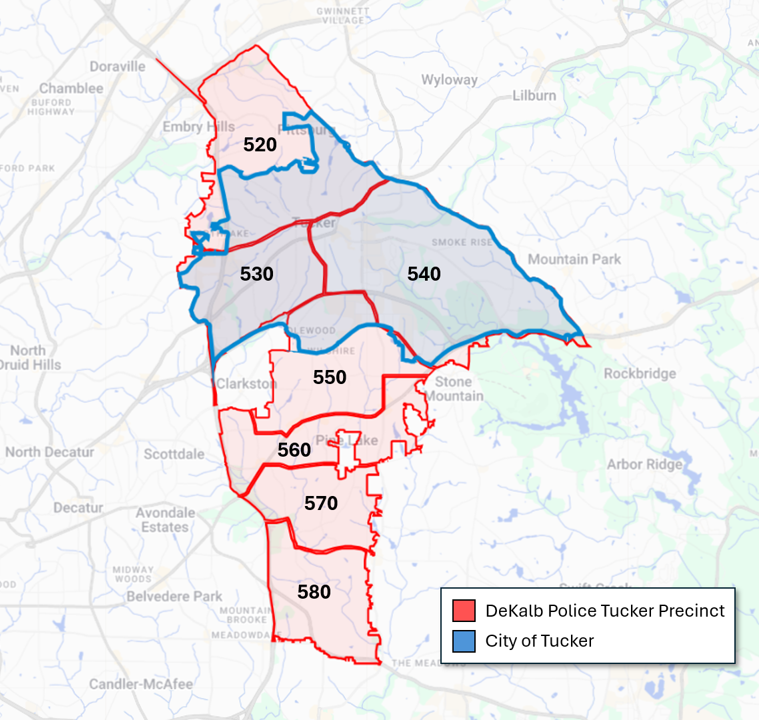 ,
,
How many sworn officers would be included in the Tucker Police Department’s staffing plan?
The recommendation for staffing in the first year includes 53 sworn officers and 10 civilian personnel, totaling 63 full-time employees, with 8 officers on patrol per watch. Below is a listing of the 63 positions recommended for year one. With an enhanced quality of service delivery, the department will be asked to expand the programs and services offered to meet the community’s growing service expectations.
Sworn: 53 | Non-Sworn/Civilian – 10 |
Chief – 1 | Evidence Technician/Property – 2 |
Major – 2 (Operations and Administrative) | Executive Assistant (Chief) – 1 |
Training Sergeant – 1 | Administrative Assistant – 2 (Operations and Administrative) |
Professional Standards Sergeant – 1 | Records/GCIC – 5 (4 Staff/1 Supervisor) |
Uniform Patrol – 40 | |
4 Squads – 10 Officers Per Squad | |
(8 officers, 1 sergeant, and 1 Lieutenant per squad) | |
Criminal Investigations – 8 | |
(6 detectives, 1 sergeant, 1 lieutenant) | |
How would a Tucker Police Department respond to major emergencies requiring more resources?
Tucker would join regional mutual aid agreements with other law enforcement agencies to enhance emergency response capabilities. Mutual aid agreements allow for the sharing of personnel, equipment, and resources between agencies during critical incidents.
Today events like emergency plane landings on roadways or large highway crashes draw support from multiple jurisdictions. Tucker police would both give and receive such aid.
Would Tucker need a police helicopter?
No. Tucker could follow the example of cities like Brookhaven and use drones instead. Drones are more cost-effective, create less disturbance, and can be deployed faster and more efficiently than helicopters.
In 2024, Brookhaven’s drones where first on scene for 72% of calls with an average response time of 70 seconds. Annual operating expenses totaled $451,000. In 2012, DeKalb County spent approximately $1.6 million to replace a police helicopter lost in a 2010 crash.
Sources: DeKalb police helicopter lands in park, AJC, June 12, 2012; Georgia police department dispatching drones to emergency calls, CBS Mornings. January 3, 2024; Brookhaven Police Department adopts new technology to save time and money RoughDraft Atlanta, August 25. 2025.
Would the department include specialized units like K-9 or traffic enforcement?
Based on the recommendation in the study, not initially. Specialty units can be added over time based on community needs, crime trends, and available funding.
Questions about 911
Do all cities in DeKalb County use DeKalb County 911?
No. Chamblee, Decatur, and Doraville operate their own 911 systems. Brookhaven and Dunwoody contract for 911 services with ChatComm.
How does DeKalb County 911 compare to other metro Atlanta providers?
According to AJC reporting in 2025, DeKalb had the lowest response rate in metro Atlanta. In April 2024, nearly two-thirds of callers waited over 20 seconds. By December, performance improved, but it still lagged behind systems like ChatComm, which answered 96.6% of calls in under 10 seconds.
Source: How metro Atlanta’s 911 systems evolved after series of tragedies AJC, March 20, 2025
How do police and 911 response times in Tucker compare to those in Brookhaven and Dunwoody?
In 2023 and 2024 DeKalb 911 dispatch times were 4.9x slower than Brookhaven and 4.3x slower than Dunwoody. During the same period the average DeKalb County Police response times in Tucker were 8+ minutes, compared to under 3.5 minutes for these neighboring cities.
| Brookhaven Police / ChattCom 911 | Dunwoody Police / ChattCom 911 | DeKalb County Police & 911 in Tucker | |
| Time to dispatch from 911 | 1m:17s | 1m:26s | 7m:37s |
| Response time from police | 1m:58s | 3m:22s | 8m:12s |
| Average time spent on the on-scene | 29m:34s | 33m:49s | 30m:37s |
If Tucker changes 911 providers, how would this impact DeKalb Fire Rescue?
DeKalb Fire Rescue would continue to serve Tucker. In Brookhaven and Dunwoody, 911 calls needing DeKalb Fire Rescue, including EMS, are forwarded electronically and through a secondary call from ChatComm to DeKalb County 911. Tucker would likely use a similar dual-process system.
How is 911 funded and how would a city police department potentially impact 911 in Tucker?
911 is primarily funded by a monthly $1.50 service fee collected on all wireline, wireless, and voice over internet protocol (VoIP) telephone services within the 911 service area. The Georgia Department of Revenue disburses a portion of these fees monthly to qualifying counties and cities that operate or contract for the operation of a 911 center.
If Tucker were to form a city police department and continue to use DeKalb County for 911, nothing would change. The funds collected for lines of service in Tucker would continue to go to DeKalb County.
If Tucker were to choose to become a qualifying city, or to contract with another 911 service provider like ChatComm, those funds would go to the city or it’s service provider.
For more information on funding for 911 visit: Georgia Emergency Communications Authority.
Questions about funding
Will forming a city police department in Tucker require a tax increase?
No. In 2024, property owners in Tucker paid $15.9 million to DeKalb County for police services. In the current tax year, the DeKalb County Board of Commissioner’s chose to reduce funding for Police Services lowering this amount to $15.5 million. According to the Georgia Association of Chiefs of Police, the City of Tucker could establish and operate its own professional police department for just $10.7 million. That would leave the city with nearly $5 million to enhance police staffing, equipment, and operations without raising taxes.
Does the projected revenue for a city police department include funds from fines and other fees?
No. The study did not include fines and other fees as a source of revenue. Based on property tax collected in 2024, $15.9 million, and assessments for 2025, $15.5 million, there is enough to sustain a city police department without dependence on fines and fees.
Will forming a city police department in Tucker affect the EHOST credit, property tax exemptions, or freezes?
No. The EHOST credit and property tax exemptions, such as the homestead exemption, and freezes will not be affected by forming a city police department.
Is the cost of a police department headquarters included in the study?
No. The cost of a building is not included in the study. Options include leasing or renovating an existing building, negotiating with DeKalb for the Tucker Precinct building, or constructing a new facility as a long-term solution.
What is the average cost of a fully equipped patrol vehicle ?
The average cost is approximately $71,067 per unit, including vehicle and full police equipment. Patrol vehicles would be equipped with lights, sirens, in-car video, laptops, AEDs, crime kits, radios, weapons, and prisoner transport features.
Are private property owners and others in Tucker paying for additional security?
Yes. Many private property owners, businesses, in Tucker pay for supplemental security on top of the county taxes they already contribute for police services. This includes hiring off-duty police officers, contracting with private security companies, and funding additional patrols and cameras through Community Improvement District (CID) programs. In effect, many in Tucker are paying twice for public safety—once through county taxes and again through supplemental measures—because of concerns about the adequacy of current service levels.
How much did this study cost and who paid for it?
The study cost $45,000 and was funded by the Tucker-Northlake CID, Tucker Summit CID, Tucker Civic Association, Tucker Business Association, Tucker Main Street Alliance, Smoke Rise Civic Association, and the Northlake Condominiums.
Impact on DeKalb County
Is DeKalb County and the City of Tucker aware of this study?
Yes. The Tucker-Northlake CID and our partners continue to be open about our goals to improve public safety. CEO Lorraine Cochran-Johnson and her leadership team were informed early in this process and have been given copies of the study.
We respect the diligent work of the DeKalb County Police Department—particularly the officers who respond to back-to-back calls in difficult situations every day. We are taking a proactive and inclusive approach to finding solutions, and we appreciate all that DeKalb County is doing simultaneously to improve conditions within the department and countywide.
We have also kept Tucker Mayor Frank Auman and interested members of the City Council informed. We appreciate their stewardship over taxpayer resources and interest in our vision to make Tucker the safest community in DeKalb and one of the safest in metro Atlanta.
Was the City of Tucker or DeKalb County involved in supporting this study?
No. This study was conducted independent of the City of Tucker and DeKalb County. Both were informed of the study before it began and both provided information to the Georgia Association of Chiefs of Police that contributed to the analysis.
What would be the impact on the DeKalb County Police Department were Tucker to create a city police department?
Based on property tax assessment in Tucker from 2024 ($15.9 million), a city police department would:
- Reduce the DeKalb County Police budget by just under 10%
- Reduce the area serviced by DeKalb County Police by 9.7%
- Reduce the population served by the DeKalb County Police by 7%
See Dekalb County Fiscal Year 2025 Annual Budget pp. 5 – 7. Accessed: 07/21/2025.
Why did DeKalb County conduct a fiscal impact study on potential municipal incorporations and service displacement in 2019?
The study, launched in 2019, was prompted by proposals to create new cities like Greenhaven and Vista Grove and by annexation debates. It analyzed how incorporation would affect county revenues and services, fairness across communities, and policing scenarios involving Tucker, Stonecrest, or DeKalb exiting police services altogether.
What will happen to officers and other employees currently working in the DeKalb County Tucker Precinct if Tucker created a city police department?
They would be continue to be employed by the DeKalb County Police Department. The reduction in service area (9.7%) and population (7%) would contributed to a reduction the County’s staffing shortage, improving officer to population ratio, and potentially improve response times in unincorporated areas.
How would a Tucker Police Department affect DeKalb County courts?
Misdemeanors in Tucker could be handled by a city solicitor in a municipal court. This would reduce the workload on the County court and the County Solicitor. It would also enable the City to enforce city specific ordinances. Felonies would still be processed by the DeKalb County District Attorney and Superior Court, since only the County can maintain a District Attorney’s office.
What happens to existing open cases if Tucker creates its own department?
DeKalb County Police would continue handling open cases initiated before the transition. All new cases after the department’s launch would be handled by Tucker Police.
Would the City of Tucker have its own jail?
The GACP study says, “Under no circumstances should the City consider operating their own facility.” Operating a detention facility is a very complex and potentially litigious endeavor. The Dekalb County Sheriff’s Office offers one of the most supportive housing arrangements for police departments of any sheriff’s office in the State.
Tucker would contract with the DeKalb County Jail, which already provides supportive booking and holding services.
How long would it take to launch a city police department?
A 12 to 18 month period is typical, accounting for hiring, training, facilities, and procurement.
Questions about Hiring
What employee benefits are suggested and will the city offer hiring bonuses?
The GACP recommends above-average pay, healthcare, vacation credit, retention bonuses, and employee assistance programs specialized for law enforcement. A signing bonus and salary premium are recommended during the department’s launch to attract experienced officers.
How will the city support officers’ mental health?
The city should contract with a law enforcement-specific Employee Assistance Provider (EAP) and offer a chaplaincy program.
Who would hire the first police chief?
The City Manager and City Council would appoint a Georgia POST-certified chief, who must also attend executive law enforcement training.
How many shifts or watches are there in a day?
The DeKalb County Police Department currently operates three 10-hour watches each day:
Morning Watch: 10:00 p.m. – 8:00 a.m.
Day Watch: 6:00 a.m. – 4:00 p.m.
Evening Watch: 2:00 p.m. – 12:00 a.m.
Each watch overlaps with the preceding one by two hours.
If the City of Tucker decides to establish a police department, it is recommended that the uniformed patrol division be assigned to work 12-hour schedules. This schedule enables officers and supervisors to work the same schedule together as a collective group. In addition, this schedule allows for maximum staffing on all shifts, fixed rotations of off-days, and a consistent, fair schedule for all employees.
Crime and Quality of Life
Why doesn't Tucker have a city police department?
To incorporate as a city in Georgia, the proposed city must agree to provide a minimum of three services. Based on community polling in 2014, prior to incorporation, the top three services requested by residents were code enforcement, zoning, and parks and recreation. While some residents expressed interest in a city police department, it was a far distant fourth in polling results.
Selecting just three services and not including police followed the “city-lite” concept of Peachtree Corners. It was known that at any point after the creation of the City of Tucker; the city council could elect to take on additional services.
Source: Peachtree Corners’ new government gets its start AJC April 18, 2012.
Are there areas in Tucker with a higher concentration of crime?
Yes. In general, commercial areas have more reports of crime than residential neighborhoods. The exception is the Juliette Road area. Based on 911 dispatch data for police and emergency medical services (EMS) in 2023 and 2024, calls for service are disproportionately high when compared to other residential areas.
This comes as no surprise, as data from the Atlanta Regional Commission on Life Expectancy in DeKalb County shows that residents in the Juliette Road area have the lowest life expectancy of any area in DeKalb County, 68.4 years. By contrast, life expectancy on the other side of US 78 in Smoke Rise is 78.9 years.
Due to staffing and geographic limitations this area experiences longer dispatch and travel times, even for high-priority incidents.
Will creating a city police department improve crime statistics?
Over time but not at first. Typically, reports of crime increase with new police departments due to an increase in responsiveness. Responsiveness tends to rise with more officers, a smaller, dedicated patrol area, and a stronger focus on local concerns.
Eventually, this increase in numbers subsides. It is important to understand that a city police department will not eliminate all issues any more than a city public works department will eliminate the formation of all potholes. What it does mean, based on the experiences of other communities, is that the response to address them tends to be quicker.
Does Tucker have plans to police its trails or the Tucker Town Green in Downtown Tucker?
Currently, there is no dedicated strategy for policing the city’s emerging trail network or the Tucker Town Green in Downtown Tucker. The DeKalb Police Department does not provide routine trail patrols. A city police department could offer tailored patrol plans for these community assets.
Today the Tucker-Northlake CID provides supplemental patrols of the alleys in Downtown Tucker. These patrols are funded by commercial property owners and are not a long term solution.
Who makes the final decision to create the police department?
The City Council must vote to place the question on the ballot, and then voters within Tucker city limits must approve it in a public referendum.
Questions about a City Marshal’s Office
What is a Marshal’s Office?
A local Marshal’s Office is a law enforcement agency established by a city or county to handle duties more limited in scope than a full police department. Its role depends on local law and what responsibilities the governing body assigns.
Typical functions include providing court security and bailiff services, protecting city facilities, serving municipal court warrants, enforcing local ordinances, and in some cases assisting police with specialized tasks. While important for city operations, a Marshal’s Office is generally not the community’s primary law enforcement agency.
Why did the City Council approve creating a Marshal’s Office in Tucker?
On August 11, 2025, the City Council approved creating a Marshal’s Office to replace the work of the DeKalb County Police Department in Tucker’s Municipal Court, and to provide protection for those on city property. The City says the motivation for doing so is to increase efficiency and responsiveness to city needs.
“This structure will allow for increased efficiency in judicial and enforcement functions, while ensuring public safety services are responsive to the city’s needs. As Tucker continues to grow, the need for dedicated positions responsible for court and city security, warrant service, and enforcement of municipal ordinances has become increasingly evident. Many municipalities in our region have successfully implemented similar positions under a City Marshal’s Office, typically operating under the jurisdiction of the municipal court or city administration.”
Source: Ordinance O2025-06-14 CH 2 City Marshal 08-11-2025, Mayor & City Council Regular Meeting Minutes August 11, 2025, p. 2 – 3
Will the City Marshals assist in an arrest off city property?
No. If a City Marshal observes a crime taking place off city property they will call 911. Marshals in Tucker do not have a public duty to enforce the law when witnessing a crime. They are authorized use arrest powers on city property if needed.
Are City Marshal’s Offices a common in city governments?
No. City Marshal’s Offices are not common. Most cities either rely on a full police department or on their county sheriff’s office for law enforcement needs. Marshal’s Offices tend to be created for very specific, limited duties like municipal court security, serving warrants, or protecting city facilities.
City-level marshal’s offices in places where:
- The city doesn’t want the expense of a full police department but needs someone for municipal court, code enforcement, or city property protection.
- The governing body has carved out duties that don’t overlap too much with the county police or sheriff.
- Historical tradition plays a role (some older cities have retained a marshal title even if the role is similar to a police chief).
How is the City funding a Marshal’s Office?
The City Marshal’s Office will be funded through the municipal budget rather than the Police Services fund collected by DeKalb County.
Source: Memo for Amendment to Code Chapter 2 Administration – City Marshal’s Office
When will the Marshal’s Office go into effect?
This change becomes effective November 1, 2025.


